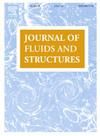垂直轴风力涡轮机的主动流动控制:来自大涡模拟和有限时间解析分析的见解
IF 3.5
2区 工程技术
Q1 ENGINEERING, MECHANICAL
引用次数: 0
摘要
主动流动控制应用于改善NACA0018翼型作为单叶片垂直轴风力涡轮机(VAWT)的气动性能。壁面分辨大涡模拟(LES)的计算结果强调了动态失速涡(DSV)和尾缘涡(TEV)对涡轮效率的不利影响,主要是通过增加阻力和能量损失来实现的。所提出的流动控制策略有效地延缓了流动分离,抑制了大规模涡的形成,特别是在中等驱动频率下。控制参数基于双全局稳定性和有限时间解析分析。这些技术确定了剪切层和尾流不稳定性之间耦合模式的激励是促进流动再附着和防止涡量积累的机制,最终导致扭矩产生的增强。该控制策略是节能的,仅消耗涡轮机输出功率的1%,同时产生可观的空气动力学性能增益。这些发现表明,基于物理信息的主动流量控制技术有望缓解动态失速,并推进下一代vawt的设计。本文章由计算机程序翻译,如有差异,请以英文原文为准。
Active flow control of vertical-axis wind turbines: Insights from large-eddy simulation and finite-time resolvent analysis
Active flow control is applied to improve the aerodynamic performance of a NACA0018 airfoil operating as a single-bladed vertical axis wind turbine (VAWT). Results computed by wall-resolved large-eddy simulations (LES) highlight the detrimental effects of the dynamic stall vortex (DSV) and trailing-edge vortex (TEV) on turbine efficiency, primarily through increased drag and energy loss. The proposed flow control strategy effectively delays flow separation and suppresses large-scale vortex formation, particularly at moderate actuation frequencies. The control parameters are grounded in bi-global stability and finite-time resolvent analyses. These techniques identify the excitation of coupling modes between shear layer and wake instabilities as a mechanism for promoting flow reattachment and preventing vorticity accumulation, ultimately leading to enhanced torque production. The control strategy is energy-efficient, consuming only 1% of the turbine’s output power while yielding substantial aerodynamic performance gains. These findings demonstrate the promise of physics-informed active flow control in mitigating dynamic stall and advancing the design of next-generation VAWTs.
求助全文
通过发布文献求助,成功后即可免费获取论文全文。
去求助
来源期刊

Journal of Fluids and Structures
工程技术-工程:机械
CiteScore
6.90
自引率
8.30%
发文量
173
审稿时长
65 days
期刊介绍:
The Journal of Fluids and Structures serves as a focal point and a forum for the exchange of ideas, for the many kinds of specialists and practitioners concerned with fluid–structure interactions and the dynamics of systems related thereto, in any field. One of its aims is to foster the cross–fertilization of ideas, methods and techniques in the various disciplines involved.
The journal publishes papers that present original and significant contributions on all aspects of the mechanical interactions between fluids and solids, regardless of scale.
 求助内容:
求助内容: 应助结果提醒方式:
应助结果提醒方式:


